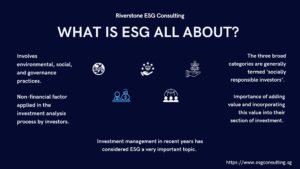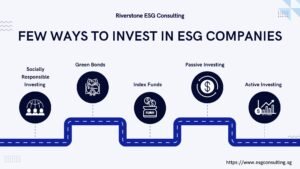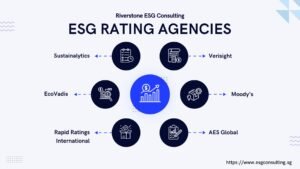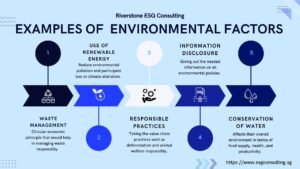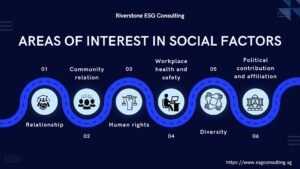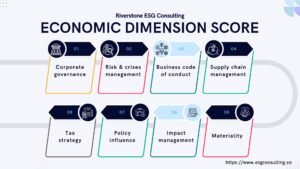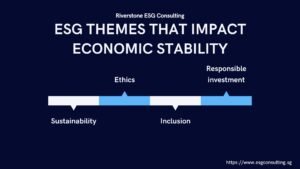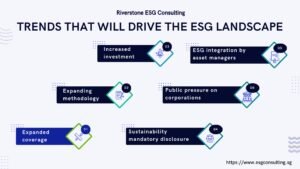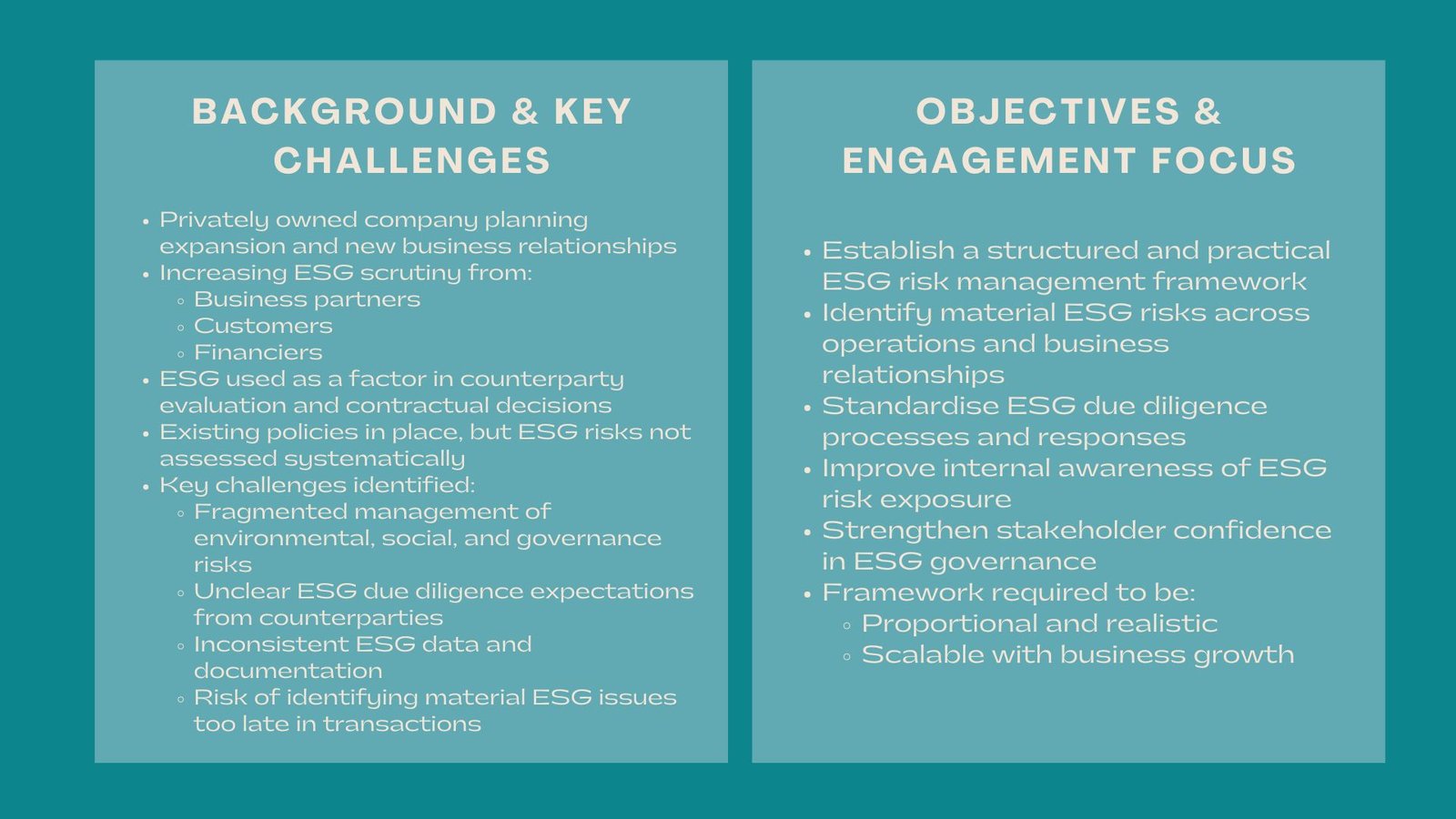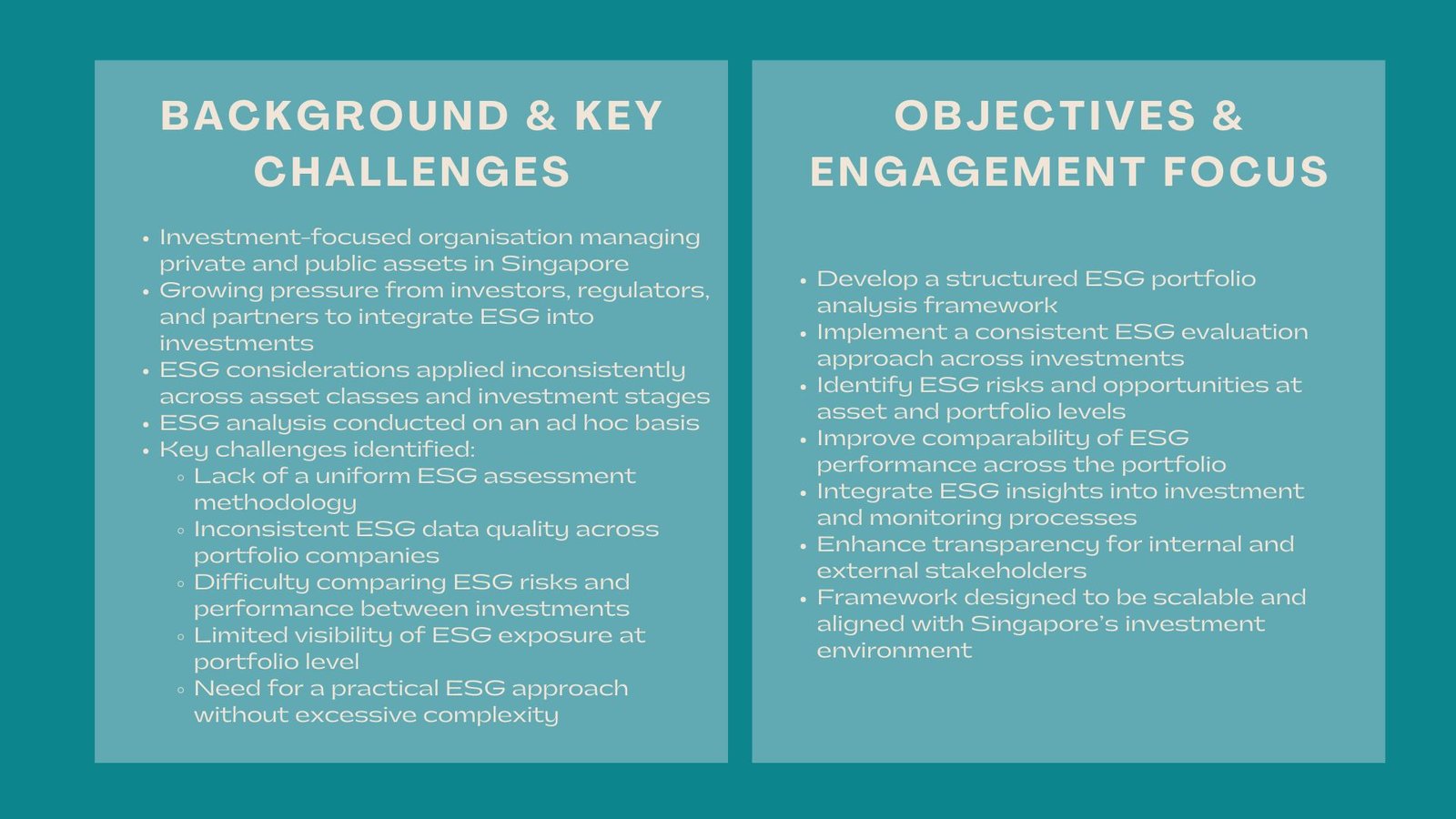Best ESG Reporting Services in Singapore
Introduction
Sustainability is no longer discussed as an option to the business in Singapore but is now a key pillar of the corporate strategy and long-term resilience. As they expect more accountability by the global investors and regulators increase the pressure on disclosure, those companies that do not take any action on Environmental, Social and Governance (ESG) reporting would be left behind.
The Singaporeans have taken the lead by increasing the demand of professional ESG reporting services in this environment. These services assist businesses to gather, examine and report ESG information in a manner that satisfies the domestic and global norms. Simultaneously, numerous corporations invest in corporate ESG training in Singapore in order to provide their leaders and employees with the knowledge about the sustainability frameworks and their ability to implement them in practice.
This blog will discuss why ESG reporting is important, the expectations of businesses to benefit under the professional services, and the manner in which training and strategy will both converge in the creation of value that is continually built.
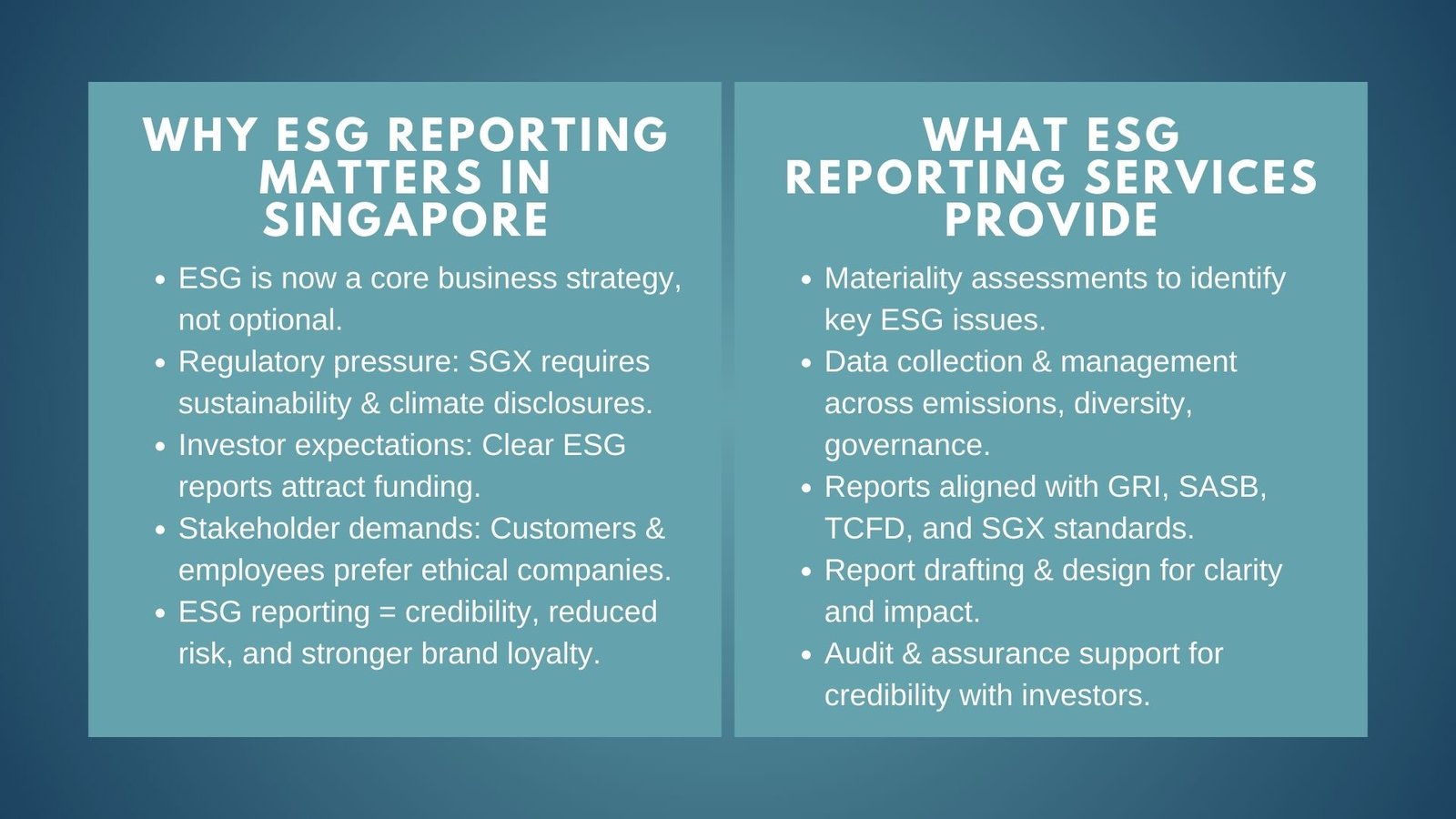
Why ESG Reporting Matters More Than Ever
The relevance of ESG reporting has been gaining momentum over the past few years, mostly due to a number of factors that have a direct influence on Singaporean businesses:
1. Regulatory Pressure
Singapore Exchange (SGX) gives the annual sustainability reports to listed companies. Since 2022, the climate-related disclosure according to the Task Force on Climate-Related Financial Disclosure (TCFD) has become a mandate concerning the industries of finance, agriculture, and energy. The trend should continue to other sectors in future years.
2. Investor Expectations
International and local investors are taking into consideration ESG factors in their decision-making. The clear reporting of companies will be more likely to attract funds, whereas companies with poor or no disclosures will have capital costs.
3. Stakeholder Demands
Customers, employees, and business partners are increasingly willing to do business with organizations that can be characterized as having ethical and sustainable operations. ESG reporting gives an account of these commitments.
4. Global Standards
Other frameworks like the Global Reporting Initiative (GRI), the Sustainability Accounting Standards Board (SASB), and the TCFD have established international standards. Singapore companies need to match these requirements in order to be competitive in the international scene.
ESG reporting thus does not merely involve taking part in compliance requirements. When done right, it will be a strategic weapon that makes credibility, minimizes risks, and boosts brand loyalty.
What Professional ESG Reporting Services in Singapore Provide
Engaging with professional ESG reporting services in Singapore offers businesses several key benefits:
- Materiality Assessments
The consultants collaborate with the stakeholders to determine the ESG issues that are most appropriate to the operations of a company and its industry. To give an example, carbon intensity can be a decisive factor in manufacturing companies, and data privacy and governance can be relevant to financial organizations.
- Data collection and Data management.
ESG reporting involves the proper data on a vast variety of measures – not only greenhouse gas emissions but also workforce diversity, and the structure of the board. To collect such information, verify and analyze it, professional services develop the reliable systems.
- Conformity to World Systems.
Seasoned consultants make sure that reports are prepared in accordance to internationally accepted standards including GRI, SASB and TCFD, and SGX requirements. The alignment assists companies in attracting the domestic and foreign investors.
- Report Drafting and Design
In addition to quantitative data, an effective report on ESG conveys vision, values, and development of a company in a straightforward and convincing manner. Professional reporting services usually involve editorial and design help in order to make reports more exciting.
- Assurance and Audit Support
Shareholders attach importance to third-party guarantees. ESG consultants assist in preparing companies to be audited by external companies as well as integrity and transparency of data.
With the help of these services, it is possible to turn ESG reporting into an opportunity to create value rather than a liability to the businesses.
The Role of Corporate ESG Training Programs in Singapore
While professional reporting services provide structure and credibility, companies also need internal expertise to sustain their ESG journey. This is where corporate ESG training programs in Singapore make a significant difference.
Training ensures that:
- ESG fiduciary responsibilities are familiar to board members.
- The executives are also ready to incorporate ESG into corporate strategy.
- The employees know about the sustainability practices that are useful in their jobs.
An effective ESG training program will normally include:
- Introduction to ESG frameworks GRI, SASB, TCFD, and their applications to Singapore.
- Regulatory environment SGX reporting, MAS and the Green Plan 2030 of Singapore.
- Practical intervention– how to gather ESG data, best practices and connect sustainability objectives and business performance.
- Case studies – illustrations of how local and international corporations overcame the integration of ESG
By investing in corporate ESG training, businesses create a culture of sustainability that strengthens both reporting and overall performance.
Case Example: ESG Reporting in the Singapore Market
As an example of the effect of professional services and training, one can take a manufacturing company with its headquarters in Singapore which is about to write its first sustainability report.
- Devoid of external aid, the company was ineffective at determining the material ESG factors; they did not have consistent data on energy use and emissions.
- By engaging professional ESG reporting services in Singapore, the firm conducted a materiality assessment, set measurable targets, and prepared a GRI-aligned report.
- At the same time, the company invested in corporate ESG training programs in Singapore to educate management and staff about data collection and sustainability initiatives.
The outcome was a credible, comprehensive sustainability report that impressed investors and positioned the company more favorably in supply chain negotiations.
ESG Reporting Trends to Watch in Singapore for 2025
As Singapore further consolidates its sustainability program, companies need to be ready to face a number of trends:
1. Compulsory Climate Reporting Increase.
Increased industries will be mandated to come up with climate-related disclosure. Compliances will be avoided due to early preparation.
2. Integration with Finance
The Monetary Authority of Singapore (MAS) has also implemented the guidelines on environmental risk management of financial institutions. ESG reporting will be strongly associated with the availability of green finance and loans.
3. Technology in ESG Reporting
Accuracy and traceability on the disclosures of ESG are being enhanced using digital platforms, AI-based data analytics, and blockchain.
4. Pay attention to Social and Governance Issues.
Although climate reporting is dominating the headlines, regulators and investors are becoming more and more concerned with social issues such as diversity, inclusion, and supply chain ethics, and governance practices.
Those companies that embrace such trends early will be at a competitive advantage.
Choosing the Right ESG Partner in Singapore
It is important to choose the appropriate partner in reporting ESG. Providers should be measured by businesses on:
- Knowledge in the ESG frameworks and reporting standards.
- Multitasking experience in various industries.
- Combination capability of consulting, training, and reporting services.
- Data collection and analysis technology tools.
- Leader in providing investor ready ESG reporting.
The ideal partners will not just be compliant but will assist companies to make ESG reporting a source of long-term strategy and development.
Conclusion
ESG reporting is not a tick-box activity anymore, it is a potent weapon of trust building, creating resilience and business success. The companies, in Singapore, cannot afford to overlook the significance of credible reporting and training of skilled workforce, as the sustainability regulations and expectations of the investors are increasing at a blistering pace.
Through the use of the services of professional ESG reporting in Singapore and the investment in corporate ESG training in Singapore, businesses will be able to fulfill the regulatory requirements, address the needs of its stakeholders, and become leaders in sustainability. The early-mover, strategic companies will not merely survive in the future in the ESG-based economy but prosper.

